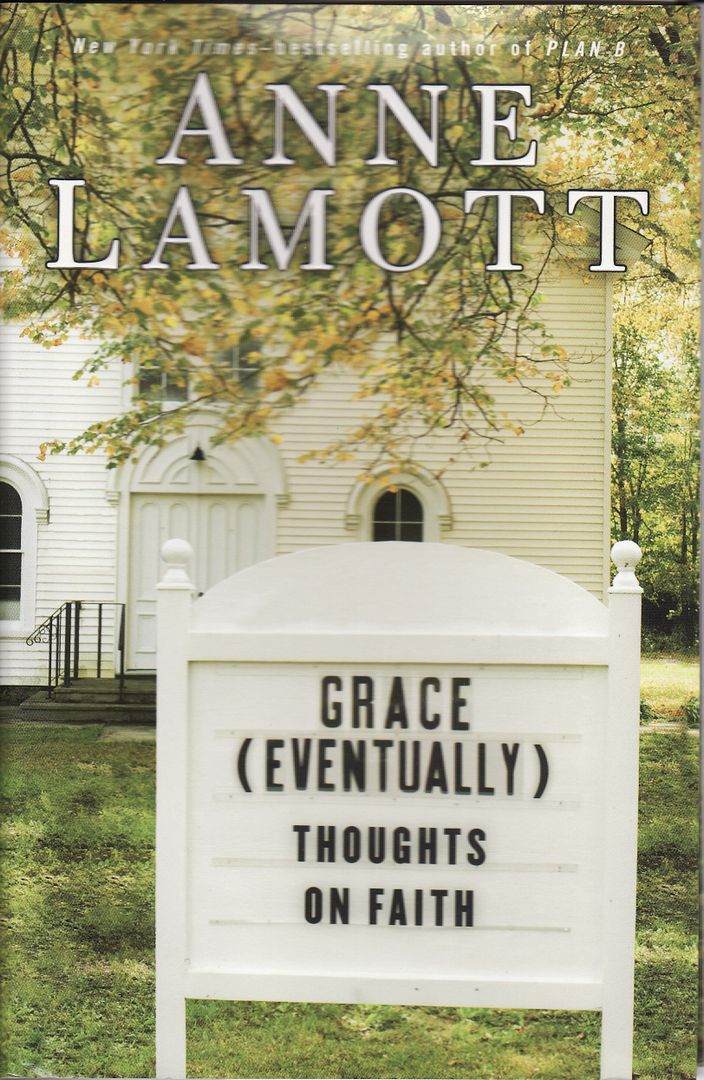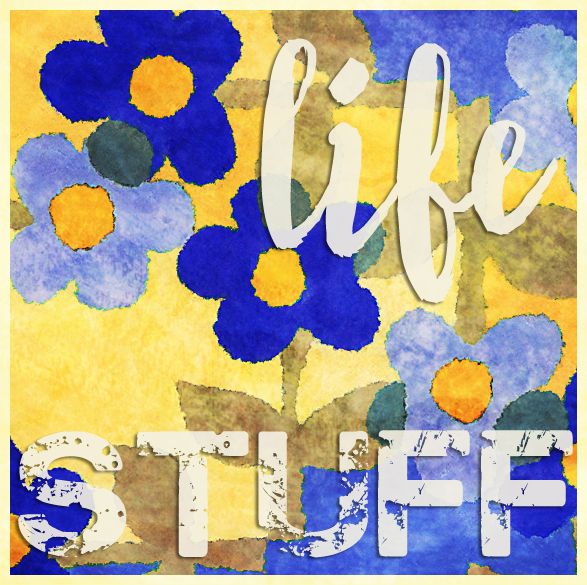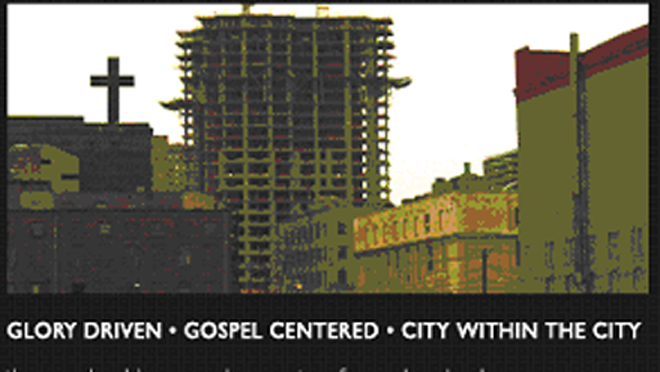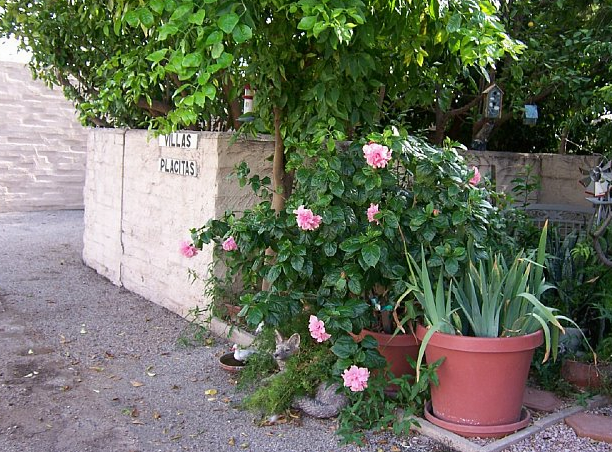Another feature from RevGalBookPals! For a bunch of reasons, I didn't do the last two, but I've read this month's and plan to blog on September's book, too; in fact, I started reading it before I received this one from Amazon.
Anne Lamott,
Grace (Eventually): Thoughts on Faith on Amazon

My first impression was Anne Lamott's easygoing, easily understandable yet wonderfully and thankfully unannoying writing style. A couple times I stopped and tried to deconstruct it some, but decided I'd rather keep reading. Late this afternoon I finished the book, but what on earth is it about book covers with iconic (without a doubt) white (or thereabouts) clapboard church buildings plunked down and settled in amidst verdant Midwestern or New English (doubtless) shade trees? Is there any other possibility?
At first I thought this is kind of coolly about real life, but next I thought, "I think I'm just as clever, brave, honest, mellow (no, not that one yet), wise and perceptive as Ann(i)e Lamott, and I'd love to be published between covers rather than just on a blog screen, too." A week ago, when I read half the book (picking and choosing the next chapter according to how intriguing the title seemed), I kept thinking, "we all are not all that f***ed up, are we? She so seems to be into total depravity! It will take the world 1,000 years to recover from GWB? I thought this book was about grace!" But the further I got, the more I knew she was writing about me, and with such credibility: not only is it an actual printed hard-copy (because after all, so is the National Enquirer), but it's a bound book by a non-sensational author. That rocks!
I may have 2
nd and 3
rd thoughts after posting this blog, but I've been trying to explain my grief, my sense of death, of loss of self, of identity, and my perplexity (better perplexed than depraved?!) to at least a dozen people who apparently believe they have answers for my experiences of these too many years, people who do not know me, my aspirations or my history and who have not been with me at all, beyond an incidental pickup (I'm using "pickup" in the sense of a pickup ball game, or maybe truck, or pickup sticks—but not a Saturday night bar-type pickup) conversation. To introduce the
In Circulation section, on page 83 AL quotes
Separation (previously unknown to me), by W.S. Merwin (a poet not known to me until now); here's an "about" from the page I linked to:
W. S. Merwin's new and selected poems, Migration, won the 2005 National Book Award for Poetry. His most recent book of translations is Jean Follain's Transference of the World (2003). Both are from Copper Canyon Press. Your absence has gone through me
Like thread through a needle.
Everything I do is stitched with its color.
That perfectly describes my own experience of emptiness, of being abandoned by life, of wondering why I ever imagined my life soon would have meaning and purpose again and that I'd have an adequate income. I never could have imagined this much loneliness and devastation for this long a time. "They" say make a new normal, and I haven't been able to do so. I am weary of folks in casual interchanges telling me to pay no attention to anything anyone says. Hey, if there's one reason more than another that I'm in this situation, it's that I've constantly disregarded almost everything negative almost everyone ever has said to me or about me. After all, it's a backhanded compliment, they obviously envy me, they very much want me to participate but don't want to exploit me, I need to be patient and wait until they're comfortable with me...
In the
Dance Class chapter in the
Dance Class section, on page 38, AL insists, "...humans want and need exactly the same thing: to belong, to feel safe and respected...And...dancing almost always turns out to be a good idea." Same chapter, pages 40-41:
I'm not comparing the hardship of being developmentally disabled to that of being an alcoholic or a drug addict, but in dance class, I noticed all sorts of parallels: the off-rhythm gait, the language you can't quite catch, the lack of coordination, the odd affects...the screwed-up relationships or no relationships at all, the not-fitting-in-ness. ...All of us lurch, and fall, sit in the dirt, are helped to our feet, keep moving...help others get back on their feet, and keep going.
But I used to fit in! As Oprah said to a teenaged girl one of the rare times I watched her show, "You know you can't do it [life] on your own, by yourself." Jesus asked the guy by the Bethsaida pool, "Do you want to be healed?" and the guy responded, "Sir! There is no one to pick me up and put me in the pool after the angel stirs the waters." Exactly! Even when I've asked, requested, begged and pleaded...I knew my life and the world around me would regenerate and rebuild, because, after all, is the power of resurrection, of life – of
grace – not so incessant, persistent and overwhelming that nothing can block it?! I would hope at the very least God would allow me to become minimally a wounded healer of sorts. From one of those casual conversational exchanges that took place a few weeks ago:
Acquaintance: You keep beating yourself up over the past.
Me: Not in the least—anything but! I'm trying to salvage a life that will make some use of my gifts, education and background.
Acquaintance: But you're disabled!
Me: I am?!?!?
Acquaintance: Yes; it's very obvious.
For maybe the second or third time in my entire life, I was thunderstruck and stuck for words, though long ago I got used to the "What medication are you on?" question in job interviews, with my "none" response usually followed by, "you'd better get some medication if you expect to get a job."

After solemnly deciding to not continue serving professionally in the church, knowing for sure it was the best stewardship of my gifts, education and life, despite telling myself churches of a different (non-local neighborhood, non-working-class, non-struggling mightily to stay above the ground) type would have given me different results, these days I simply do not know. A person cannot be fully human without the interwoven fabric of connectiveness, belongingness, participation, recognition and acknowledgment. Because it's real and alive, it can be torn, tattered, ripped apart, rewoven, mended and appended to other pieces (remnants) of cloth. Call it "being networked!" The friends I'd expected to grow old(er) with have abandoned and deserted me, and I feel I've lost my embeddedness in history. (Oh, I know, church, liturgy and sacraments...but you know!) In the first paragraph of the
Wailing Wall chapter, AL writes, (page 25) "You say that we don't have to live alone with out worries and losses, that all the people in their tide pool will be there for them. You say that it totally sucks, and that grace abounds." Turning over to page 26: "...in some inadequate and surprising ways, things will be semi-okay, the way wild flowers spring up at the rock dirt-line where the open-space meadow meets the road, where the ground is not so mean. Just as it's fine to know but not say that anger is good, a bad attitude is excellent, and the medicinal powers of shouting and complaining cannot be overestimated." That sounds a whole lot like a whole lot of my own writing, teaching and preaching, but where is the community with that promise for me? This is a big-time military town, and when I watch the homecomings on TV, I wonder if ever again there will be anything like a homecoming for me, a birthday party, an invitation to a social event? Being welcomed back, enjoying a party other than a church affair, invitations to lunches, dinners and whatevers used to happen to me literally all the time, and I had no reason whatsoever to imagine they wouldn't again, in reasonably due time.
Since I have unfinished blogs about two great concerts I need to work on and that likely will be less painful to write than this one, I'll end with words from
Near the Lagoon, 2004, (in the
Forgiveness section of the book);
Near the Lagoon is about AL's return to the scene of her earlier life after a long time away. Quick quote, page 141: "I almost immediately got a Twilight Zone feeling. First, I was going back to the place from which I had fled, and that is usually a signal to me that something mythical is in the works. And second, instantly a hobgoblin of a man appeared in our path...He asked...'Do you know where you are going?'" And in
Ski Patrol, on pages 18-19, toward the book's beginning, AL asserts "...God always hears our cries, and helps, and it's always a surprise to see what form God will take on earth..." Amen, amen!
my Amazon review: you may need to wait a while, but grace will be









